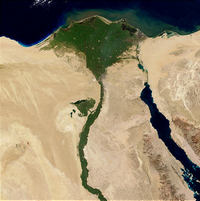In a region that already has enough conflicts, another one is brewing, and it comes from a surprising source: the Nile. The river that has traversed history from the pharaohs through to the Bible and on to the nationalist revolution of 1952 seems poised to enter a new phase. Only this time, there may not be enough water to go around.
Egypt's history is intimately tied to the Nile. A country with very little rainfall, its agriculture was long reliant on the river's annual floods. Public works projects through the late 19th and early 20th centuries subsequently helped regulate the floods, while the completion of the High Dam at Aswan in 1970 ended them altogether.
Throughout much of the same period, Western powers worried that Egypt's growing population was straining against limited resources. Grinding poverty among millions of peasants kept the country on the verge of catastrophe. The floods, like any natural phenomenon, were variable, and in weak years, disease and starvation took a devastating toll.

